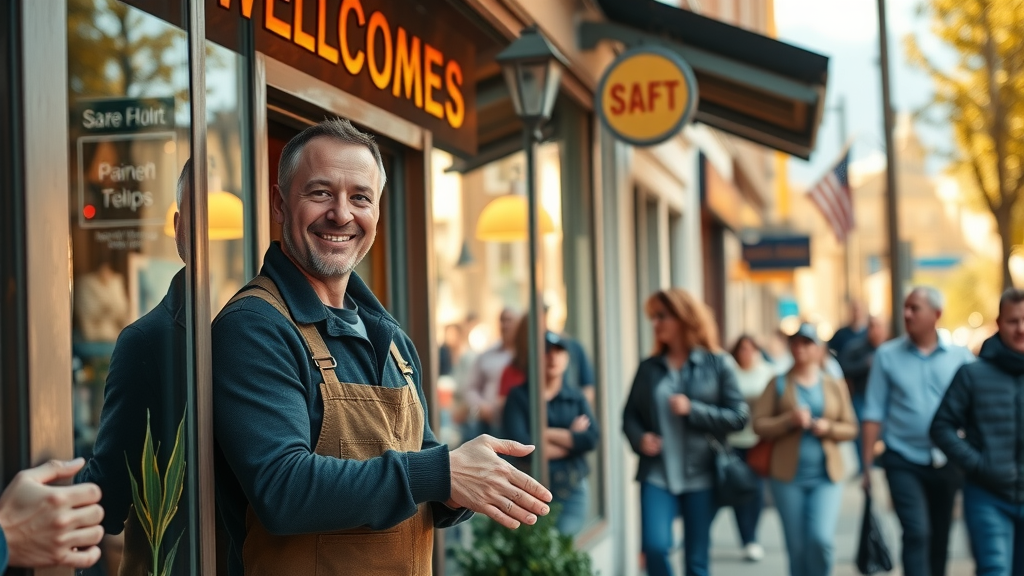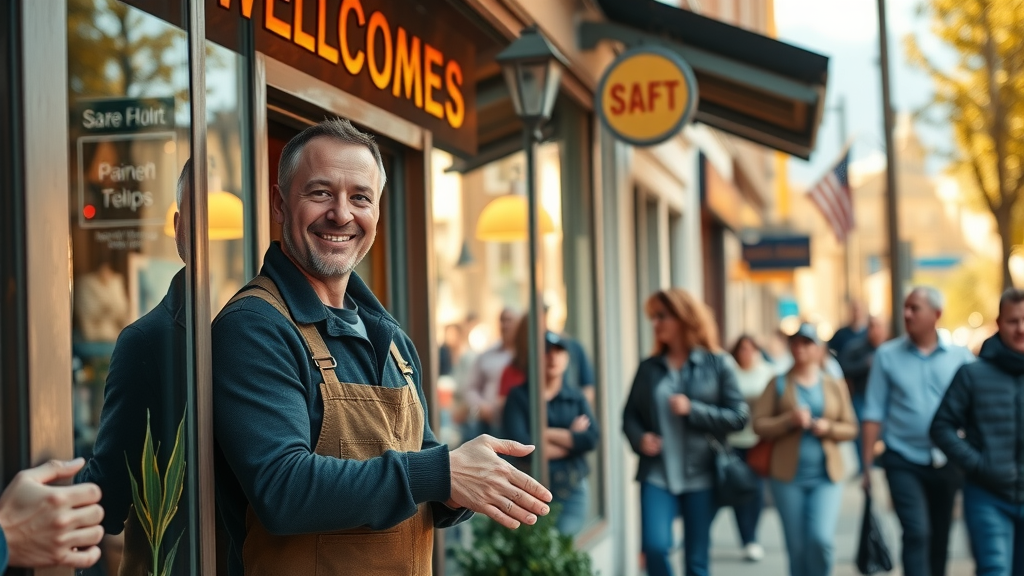Unlock Top Social Media Marketing Strategies for Local Business

Did you know that 97% of local consumers turn to online media marketing to discover nearby products and services? In today’s digital-first world, mastering social media marketing strategies for local business is more critical than ever. Whether you’re a seasoned small business owner or just starting out, this comprehensive guide will equip you with actionable, proven methods to increase your visibility, engage your community, and drive real growth. From selecting the right platforms to understanding the latest trends, learn how to stand out in a crowded neighborhood and build lasting customer relationships.
An Eye-Opening Look at the Impact of Social Media Marketing Strategies for Local Business

In the era of digital connection, social media marketing acts as a powerful gateway for local business to attract, engage, and retain customers within their communities. The rapid adoption of social media channels means potential customers are actively searching for products and services online—and expecting timely, authentic interaction from local businesses in their area. Having the right media marketing strategy is no longer optional; it’s essential for long-term success.
- Discover why 97% of local consumers use online media marketing to find nearby products and services
- Learn how implementing the right social media marketing strategy can transform your local business visibility
- Understand which marketing tools, content types, and platforms fit your business model
- Identify actionable steps to grow engagement in your small business community through social media
With customers increasingly relying on their favorite social platforms to research, review, and recommend businesses, your media presence can set you apart from competitors and foster brand loyalty. Let’s break down why a robust social media marketing strategy is the linchpin for modern local business growth.
Why Social Media Marketing Strategies for Local Business Are Essential Today
How Social Media Transforms Local Business Success

Social media marketing strategies for local business drive more than just brand awareness—they facilitate direct, two-way conversations with your target audience. Using a variety of social channels, business owners can showcase products, highlight customer stories, and react instantly to trends or community needs. This real-time interaction builds trust and positions your business as an active, engaged member of your local ecosystem.
The right social media marketing strategy amplifies word-of-mouth referrals through sharing, reviews, and user-generated content, creating a network effect that multiplies your reach. For small businesses , these digital endorsements are invaluable, often directly influencing foot traffic and sales. Social platforms enable business owners to measure what content resonates most, adjust campaigns quickly, and meet customer service expectations—all in one dynamic environment.
Examining Social Media Marketing: Trends & Challenges for Small Business
While the benefits of social media marketing are clear, small businesses face unique challenges in today’s landscape. The social media space constantly evolves—what worked last year may not catch attention today. Local business owners must stay abreast of changing algorithms, platform features, and emerging best practices to remain competitive.
One pressing trend is the shift toward authenticity and community-driven content. Consumers crave genuine stories and want their favorite neighborhood businesses to reflect shared values and local experiences. In addition, paid social options have become more accessible, allowing even modest marketing budgets to compete effectively with larger brands. Overcoming information overload, time constraints, and resource limitations are key hurdles for small business social media marketing success.
Aligning Social Media Marketing Strategies for Local Business with Business Goals
Crafting a Media Marketing Strategy Rooted in Your Local Business Objectives

To make the most of media marketing strategy , align your social media objectives with your larger business goals. Identify clear, targeted outcomes: Are you aiming to increase storefront visits, online orders, or event attendance? Use this clarity to choose the right content, social channels, and marketing tools. A tailored approach ensures consistency in messaging and builds cohesion across your brand’s digital presence.
Consider integrating your social media campaigns with in-store promotions, loyalty initiatives, and email marketing for a unified approach. This not only amplifies your efforts but also save resources and time for small business owners. Developing a content calendar and standardized posting schedule enables you to deliver steady value while tracking progress toward your objectives.
SMART Goals for Local Business: Transforming Paid Social Campaigns into Tangible Results
Setting SMART goals —specific, measurable, achievable, relevant, and time-bound—ensures your social media marketing campaigns remain on track and yield actionable results. For example, instead of simply aiming for “more followers,” set a goal such as “increase Instagram followers by 15% and drive 50 additional store visits within 90 days via targeted paid social campaigns.”
Tracking these goals through analytics makes it possible for business owners to refine strategy and budget, focusing time and spend on what works best. SMART goals turn abstract social media ambitions into concrete outcomes that support your overall business growth, from brand awareness to direct sales.
Identifying the Right Social Media Platforms for Local Business Success
Choosing a Social Media Platform That Matches Your Marketing Strategy
| Platform | Audience | Content Type | Local Engagement Potential |
|---|---|---|---|
| 18–40, highly visual, trend-driven | Photos, Stories, Reels | High—community hashtags, geotags | |
| All ages, families, local groups | Events, posts, videos, reviews | Very high—neighborhood groups, event promotion | |
| TikTok | 16–35, trend-focused, entertainment | Short videos, challenges | Medium—viral potential, discovery algorithms |
| 25–50, news & conversation | Tweets, threads, polls | Medium—local conversations, trending topics | |
| 25–55, professionals, B2B | Articles, posts, job ads | Medium—local business networking | |
| Nextdoor | 35+, families, neighbors | Posts, recommendations, events | Very high—hyper-local reach |
| Women 20–50, DIY, lifestyle | Images, boards, guides | Low–medium—niche, long-term discovery |

Selecting the best social media platform for your marketing strategy requires understanding where your target audience spends their time and which types of media content resonate most. For many small businesses, Facebook and Instagram provide robust tools for community engagement, while platforms like TikTok or Nextdoor offer newer, highly targeted opportunities. By matching your marketing objectives and media presence with the platform’s strengths, you maximize your potential for local engagement and sales growth.
Don’t spread yourself too thin—focus on the media channels that naturally fit your brand, community, and resources. This ensures consistent, high-quality content that reflects your local identity and attracts the right followers.
Understanding Your Target Audience with Social Media Marketing Strategies for Local Business
Mapping Buyer Personas to Social Media Platform Usage in Your Local Area
Accurate audience mapping is a cornerstone of successful social media marketing strategies for local business . Start by creating buyer personas—semi-fictional profiles representing your ideal customers—using demographic and psychographic data specific to your local area. Consider age, interests, shopping behaviors, and community activities.
Then, research which social media platforms these personas frequent most. For example, younger audiences may gravitate toward Instagram and TikTok, while established homeowners are more likely to use Facebook or Nextdoor. Mapping this data ensures that your campaigns appear on the right social channel at the right time, optimizing for engagement, shares, and conversions.
Tools and Analytics for Social Media Market Research and Audience Insights

Leverage analytics tools—such as Facebook Insights, Instagram Analytics, or Google Analytics—to gain a deep understanding of your real followers and their habits. Explore what content gets the most interaction, when your audience is online, and which posts drive them to take action. More advanced social media marketing tools like Sprout Social or Hootsuite can combine data across channels, making it easier for business owners to identify trends and quickly respond to changing customer needs.
“Refining our target audience transformed the way we do business. By analyzing local data and real-time feedback, we saw exponential growth—all thanks to strategic media marketing.” – Successful Local Business Owner
These insights empower local business owners to refine their marketing strategy with precision—launching campaigns most likely to hit home with those who are ready to buy, recommend, or visit your business.
Content Creation Tactics within Social Media Marketing Strategies for Local Business
High-Impact Content Creation Ideas for Small Businesses on Social Media

Effective content creation puts your local business front and center. Prioritize authenticity and value—share behind-the-scenes glimpses, customer stories, and timely promotions to build personal connections with your audience. Incorporate trending formats such as video walkthroughs, time-lapse transformations, or quick tips related to your products or services.
Create variety by blending educational, entertaining, and community-focused posts. Use vibrant images, clear branding, and local hashtags to increase discoverability. This approach attracts a broader audience while staying true to your unique business personality and the community you serve.
Local Event Promotion and Community Engagement via Social Media Marketing Tools
- User-generated content contests: Incentivize customers to post and tag your business for a chance to win prizes—boosting organic reach on social platforms.
- Behind-the-scenes local business videos: Offer followers a peek into your operations, adding transparency and personality to your brand.
- Interactive live streams for real-time engagement: Host Q&A sessions or virtual tours to foster immediate connections and address audience questions.
- Strategic use of hashtags to increase local visibility: Use location-based and event-specific hashtags to maximize local discoverability and draw nearby customers.

Promoting local events on social media channels fosters community participation and can significantly increase both online and offline interactions. Engaged audiences contribute user-generated content, tag their friends, and become advocates for your local business, further extending your media reach.
Optimizing Social Media Marketing Strategies for Local Business with Paid Social
Budget-Friendly Advertising for Small Business Growth through Paid Social Campaigns

Paid social campaigns allow small businesses to reach hyper-targeted audiences at manageable budgets. Platforms like Facebook and Instagram offer geographic targeting features so you can zero in on potential customers within your service area. Sponsored posts amplify your voice without massive marketing spend—perfect for promoting special events, product launches, or limited-time offers.
Start with a trial campaign and gradually increase investment as you analyze what works. Continuously refine your targeting settings, creative assets, and calls-to-action to ensure your paid ads drive visibility, leads, and real sales. Paid social means that even limited resources can generate big results when campaigns are carefully planned and measured.
Practical Tips for Increasing ROI with Social Media Marketing Tools
To boost your return on investment, use marketing tools that automate scheduling, optimize post timing, and track engagement. Test different ad formats and copy to see what motivates your target audience to act. Consider retargeting past website visitors or loyal customers with tailored offers—a powerful way to increase conversion rates without dramatically increasing ad spend.
Monitor key performance metrics and adjust campaigns based on what delivers results. Approach social media marketing as an ongoing process of improvement, not a “set and forget” task. Affordable tools like Canva, Buffer, or Meta’s Ad Center give small business owners sophisticated capabilities without breaking the bank.
Tracking, Measuring, and Adjusting Social Media Marketing Strategy Performance
Key Social Media Marketing Metrics for Local Business Owners
| Metric | Platform | Baseline | Monthly Growth | % Change |
|---|---|---|---|---|
| Page Followers | 1,000 | 1,150 | +15% | |
| Post Engagements | 300 | 375 | +25% | |
| Website Clicks | 50 | 65 | +30% | |
| Event RSVPs | Nextdoor | 20 | 31 | +55% |
Tracking key metrics helps local business owners understand which social media marketing strategies drive real growth. Focus on numbers like engagement rate, follower growth, website clicks, in-store visits, and event responses. These measurable outcomes tell you where your strategy excels—and where there’s room to improve.
How to Pivot Your Social Media Marketing Strategies for Local Business Based on Data

Reviewing analytics regularly enables you to pivot tactics when performance dips or opportunities arise. If Instagram Reels are outperforming static posts, shift resources to video production. If Facebook event ads drive more RSVPs than organic posts, invest more in targeted paid social campaigns.
The most successful local business owners treat media marketing as an ongoing experiment, remaining flexible, curious, and responsive to what their target audience truly wants. Data-driven decisions ensure that every effort propels you toward your goals.
Leveraging Influencer and Community Partnerships in Social Media Marketing for Small Business
Establishing Local Partnerships to Amplify Your Social Media Reach
Partnering with fellow businesses, nonprofits, or local event organizers can quickly expand your media marketing reach. Collaborate on contests, co-host digital events, or participate in “shop local” campaigns to cross-promote each other’s brands. Mutual support boosts visibility and credibility among your shared audience, creating win-win relationships.
These alliances encourage users to engage with new brands and can result in valuable referrals, reviews, and foot traffic—while keeping marketing costs low. Joint content creation and live events further personalize your business and build trust across your local network.
Micro-Influencer Tactics Designed for Local Businesses
“Maximizing local collaborations—especially with micro-influencers and community leaders—can double your exposure. Authentic partnerships build real connections, trust, and powerful word-of-mouth that advertising alone can’t buy.” – Well-regarded Media Marketing Strategist
Working with micro-influencers (social media personalities who have 1,000 – 10,000 local followers) offers a cost-effective way for small businesses to tap into established, trusted communities. Their endorsements appear more genuine, typically drive higher engagement rates, and are ideal for promoting grand openings, sales, or special events in your area.
Provide influencers with creative freedom to share your products or services in their own voice. Encourage user-generated content campaigns or offer exclusive preview experiences to spur excitement and local buzz.
Future-Proofing: Upcoming Social Media Marketing Trends for Local Business
Emerging Social Media Marketing Platforms and Features to Watch

The future of social media marketing for local businesses lies in agility. New media platforms and content formats emerge constantly, each offering fresh ways to engage. Watch for evolving trends such as shoppable posts, augmented reality filters, and local “stories” that vanish after 24 hours. These drive urgency and exclusive interaction with your brand.
Platforms like Threads, BeReal, and advanced features from Instagram and TikTok offer unique tools for local connection and transaction. Staying ahead of these trends ensures your business remains competitive, relevant, and visible as younger and more tech-savvy consumers redefine local shopping experiences.
Adapting Your Media Marketing Strategy for Continued Growth
Adaptation is the key to longevity in social media marketing. Regularly reassess your media marketing strategy and remain open to testing new formats, platforms, or messaging. Solicit direct feedback from your audience—use polls, surveys, and comments to inform your next move.
Stay connected with other small business owners in your region for a pulse on what tactics are driving success. Collaboration, experimentation, and responsiveness define those who not only survive, but thrive, in the digital marketing landscape.
FAQs: Social Media Marketing Strategies for Local Business
- What is the best social media platform for a local business? The best platform depends on where your target audience spends their time. Facebook and Instagram are excellent for community engagement, TikTok excels with younger users and trends, LinkedIn is ideal for B2B, and Nextdoor is unmatched for hyper-local outreach.
- How often should a local business post on social media? Aim for consistency—a minimum of three times per week is a solid start, but the right frequency depends on your resources and audience engagement. Monitor analytics and adjust as needed.
- How can small businesses manage social media effectively with limited resources? Prioritize one to two platforms, utilize marketing tools for scheduling and analytics, and batch content creation in advance. Leverage employee or customer advocacy to share the workload.
- What paid social strategies offer the highest ROI for local business? Use targeted local ads (geographic or interest-based) on Facebook and Instagram, retarget website visitors with special offers, and promote events or seasonal sales with short-term boosts.
- How can I measure the effectiveness of my media marketing strategy? Track engagement rates, follower growth, click-throughs, and conversions. Use analytics dashboards to compare metrics over time and see which tactics drive tangible business outcomes.
People Also Ask About Social Media Marketing Strategies for Local Business
How do you create an effective social media marketing strategy for local businesses?
- Analyze your target audience and select the best social media platforms for your business goals
- Create a tailored media marketing strategy with clear, measurable objectives
- Leverage content creation tools to develop engaging local content
- Track and adjust using analytics to continually optimize results
Which social media is best for local business marketing?
- Choose platforms where your target audience is most active: Facebook and Instagram for community engagement, TikTok for trend-based discovery, LinkedIn for B2B, and Nextdoor for hyper-local outreach
Do small businesses need a social media marketing strategy?
- Yes—every small business should have a social media marketing strategy to define voices, set goals, and maximize reach, even with modest budgets
- Improves brand awareness, community trust, and lead generation for local businesses
How much should a local business spend on social media marketing?
- Start with 5–10% of your total marketing budget on social media strategies; focus on organic and targeted paid social campaigns for strongest ROI
Expert Insights for Small Business Owners Implementing Social Media Marketing
“Local businesses that embrace a multi-channel media marketing strategy often see at least a 20% increase in foot traffic and sales within six months.” – Social Media Marketing Industry Leader
Seize the unique advantages that social media marketing offers your local business. Drawing from expert guidance and proven multi-channel strategies, your growth potential is unlimited when you commit to ongoing learning, collaboration, and analytics-driven refinement.
Essential Resources and Marketing Tools to Support Social Media Marketing Strategies for Local Business
- Top recommended marketing tools for scheduling, analytics, content creation, and community management
- Free resources and templates for crafting a winning social media marketing strategy

Empower your journey with solutions like Buffer, Hootsuite, Canva, Facebook Business Suite, and Google My Business. Access free templates, analytics dashboards, and how-to guides to regularly optimize your strategy, save time, and stay ahead of competitors—without breaking the bank.
Summary of Key Takeaways from Leading Social Media Marketing Strategies for Local Business
- Align media marketing strategy with specific local business goals
- Use data to understand your target audience and adjust optimally
- Develop creative, localized content to build community engagement
- Leverage paid social and influencer partnerships for added reach
Ready to Power Up Your Social Media Marketing Strategies for Local Business?
- Start implementing these action steps for your local business today
- Contact our team of marketing strategy experts for tailored guidance and ongoing support
Take action, test new approaches, listen to your customers, and grow your social media presence for long-term local business success!
To enhance your understanding of effective social media marketing strategies for local businesses, consider exploring the following resources:
-
“11 Top Social Media Strategies and Tips for Small Business Owners” : This article provides a comprehensive guide on defining social media goals, understanding your audience, choosing the right platforms, and developing a content strategy tailored for small businesses. ( score.org )
-
“5 Effective Social Media Strategies for Small Businesses” : This resource offers practical advice on scheduling and automating content, utilizing geotagging to engage local followers, and consistently interacting with your community to build a strong online presence. ( opticmarketinggroup.com )
By delving into these articles, you’ll gain actionable insights to refine your social media approach, ensuring it aligns with your business objectives and effectively engages your local audience.





